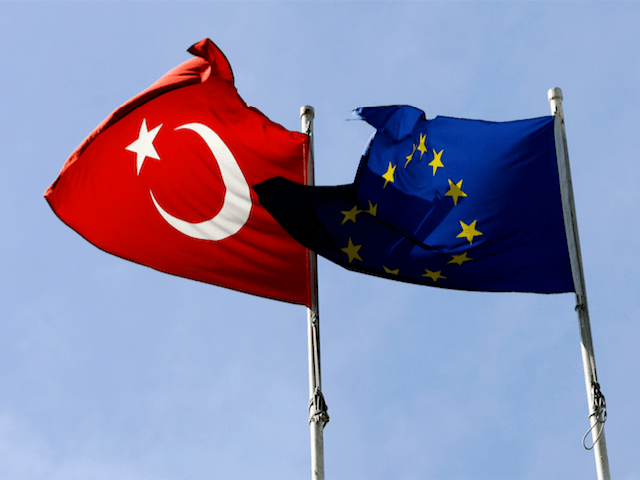(AFP) – President Recep Tayyip Erdogan has threatened to call a referendum on the future of Turkey’s EU membership bid, while Brussels accuses Ankara of “backsliding” on key commitments.
After an already exhausting process of over half a century, could this finally be the end for the long-running saga of Turkey’s EU membership bid?
The situation reached a turning point after the failed July 15 coup, with Brussels angrily criticising a relentless crackdown and Ankara accusing the bloc of failing to show solidarity.
Turkey formally applied to become a member of the European Union in 1987 and accession talks began in 2005. Its ambition to become part of the bloc dates back to the 1960s.
Analysts say that, despite all the problems. both sides are keen to keep up an illusion of an accession process. Brussels is also acutely aware of the importance of a deal with Turkey to reduce the flow of migrants to Europe.
– Half-century accession bid over? –
The Turkish government said it may now propose bringing back the death penalty, a move the EU has warned would mark the immediate end of its accession bid.
“It’s their (the EU’s) choice to continue the path with or without Turkey,” Erdogan warned in October.
But German Foreign Minister Frank-Walter Steinmeier, visiting Ankara this week, said that the ball was in Turkey’s court. “It is not a decision for Europe or the European capitals,” he said.
Aykan Erdemir, senior fellow at Washington-based Foundation for Defense of Democracies, said there is “a reluctance in Brussels to suspend Turkey’s accession process”.
“The continuation of Turkey’s membership bid is seen as one of the last tools available to the EU for checking Erdogan’s arbitrary rule.”
– What is the impact of crackdown? –
Since a rogue military faction tried to oust Erdogan from power, over 100,000 people within the judiciary, media, military and civil service have been arrested, suspended or sacked.
Among those arrested include secular daily Cumhuriyet columnists and the co-chairs of the second biggest opposition Peoples’ Democratic Party (HDP).
For Roy Karadag, political scientist at the University of Bremen, the crackdowns mean “factually, this is the end of the Turkish accession process”.
“This is a tough sell, diplomatically speaking, but no European leader can credibly commit to the Turkish accession, any longer,” he told AFP.
Yet on the surface at least, EU leaders have been keen to keep the membership bid going, with only Austria at a meeting of foreign ministers this week suggesting a halt.
EU foreign affairs chief Federica Mogherini said it was “very important that channels remain open between a candidate country and a partner and the EU”.
Presidential spokesman Ibrahim Kalin wrote in Daily Sabah that membership was a “strategic goal” for Turkey and talks should be accelerated rather than stopped.
– What future for refugee deal? –
Last year the continent experienced its worst refugee crisis since World War II, with more than a million people fleeing war and poverty landing on Europe’s shores mostly via Turkey.
In a bid to stem the flow, Brussels and Ankara agreed a ?6 billion ($6.4 billion) deal in which Turkey would take back migrants in exchange for money, visa-free travel and the opening of new chapters.
Soner Cagaptay, director of the Turkey Program at the Washington Institute for Near East Policy, said the EU was painfully aware it needs Erdogan’s cooperation in the refugee crisis.
Erdogan “could actually bluff and walk away from the EU, knowing that the EU will come to him (almost begging) in the spring when the Aegean warms up and becomes crossable for refugees again, threatening to inundate the continent with refugees.” he said.
– How great is economic dependence? –
While the rhetoric now is red hot, a significant reason that cooler heads may prevail is Ankara’s economic dependence on the EU, say experts.
Anthony Skinner, head of political risk at Verisk Maplecroft consultancy, said with Turkey’s slowing GDP growth an end to talks “would land a heavy and multi-dimensional blow to trade with Europe and inbound European foreign direct investment (FDI)”.
Erdemir agreed, saying that the president could “shy away” from suspending talks to protect the Turkish economy.
“The Turkish president might be a firebrand populist but at the same time he is smart enough to know that 85 percent of Turkey’s FDI comes from the West.”

COMMENTS
Please let us know if you're having issues with commenting.